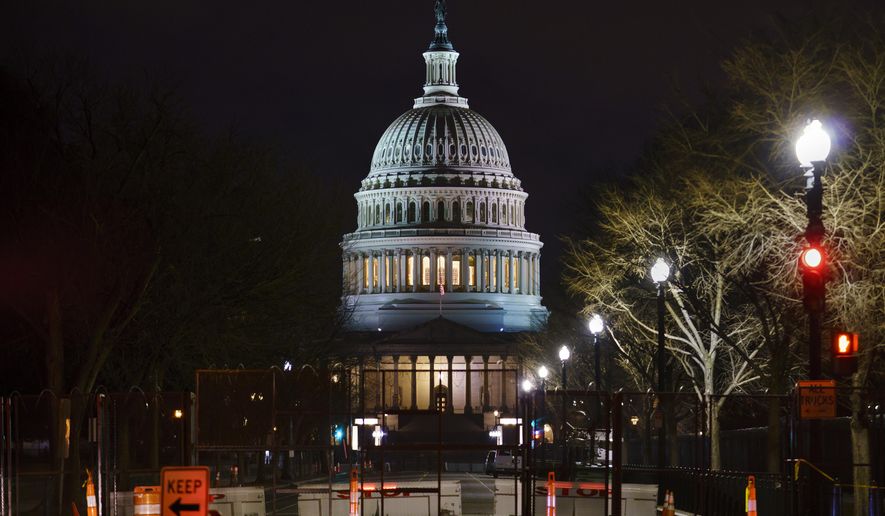Hiking the minimum wage at the same time Congress is pondering granting legal status to 11 million undocumented immigrants would create a vortex of misfortune for Black workers, and particularly Black men, a member of the U.S. Civil Rights Commission told Congress on Thursday.
Peter Kirsanow, who also is a labor lawyer and former member of the National Labor Relations Board, said the education levels of undocumented immigrants put them in direct competition with Black men who are disproportionately represented in the low-skilled labor market, and particularly areas like construction and hospitality that are also attractive to the unauthorized population.
“Illegal immigration has a disproportionately negative effect on the wages and employment opportunities of Blacks, particularly Black males,” he said, citing testimony to the Civil Rights Commission.
His cautionary testimony came as House Democrats kicked off the first hearing in what they hope is a drive for a major rewrite of the immigration system, including legalizing 11 million people currently here without permission and looking at new avenues for legal immigrants to come.
Rep. Jerrold Nadler, New York Democrat and chairman of the House Judiciary Committee, said he expects to move quickly on bills.
That includes legislation to legalize “Dreamers,” and another bill to grant legal status to agriculture workers, both of which passed the House in the previous Congress but saw no action in the GOP-led Senate.
Mr. Nadler said Democrats plan to go beyond those measures, though.
“It is estimated that the 11 million undocumented immigrants in the United States pay nearly $12 billion annually in state and local taxes,” he said. “This number would only grow if they were provided with a chance to obtain legal status.”
The battle lines were drawn at a hearing of the Judiciary Committee’s immigration subcommittee, where Democrats hosted an economist, a business advocate and an immigrant-rights activist to lay out the economic case for a more generous immigration policy.
“It’s time to end the dynamic of having immigration status function as the gatekeeper to accessing necessities and rights for all,” said Marielena Hincapie, executive director of the National Immigration Law Center.
Jennifer Hunt, a professor at Rutgers University and a member of a National Academy of Sciences panel that studied the economics of immigration, said immigrants have a net positive effect as a whole, helping raise both the overall size of the economy and boosting wages in specific quarters.
Immigrants add to the labor force, are often more flexible in their ability to move to regions of the country for opportunities, and help increase the specialization of native-born workers, which makes those workers in turn more productive, she said.
Even low-skilled workers benefit the economy by taking jobs in areas such as child care, helping more women join the labor force, Ms. Hunt said.
The 2017 NAS report found that on the whole, immigrants don’t hurt wages, she said — though some “subgroups” did suffer, and there was disagreement over how much. She said her own conclusions are that the effect on low-skilled workers is small, though she acknowledged it’s a concern, particularly amid years of stagnant wage growth at the lower rung.
Mr. Kirsanow, Republicans’ witness on the panel, said the problem comes primarily from illegal immigration.
In low-skilled jobs, they present an attractive workforce for some employers. He said they are easier to exploit, either with substandard wages or with rough working conditions that, because of their legal status, they’re unlikely to complain about.
He pointed to specific instances he’s seen in his practice as a labor lawyer where a minority-owned business was unable to compete for a job with another outfit because the other outfit was willing to hire unauthorized labor.
He also cited Democrats’ push to more than double the federal minimum wage to $15 an hour as a complicating factor, saying it would draw more migrants and create even more space to undercut the American workers’ wages, he said.
“This couldn’t be a worse time, because of the pandemic and off in the horizon is the prospect of a $15 minimum wage,” he said.
“It’s not just Black Americans, it’s all Americans, but it happens to be that Black Americans are particularly concentrated in a certain area,” he said.
Rep. Pramila Jayapal, Washington Democrat and an immigrant herself, said one way to deal with the competition issue is to legalize the unauthorized population to “level the playing field,” and then invest in education for all demographics.
“It seems like we would be in a much better place,” she said.
• Stephen Dinan can be reached at sdinan@washingtontimes.com.




Please read our comment policy before commenting.